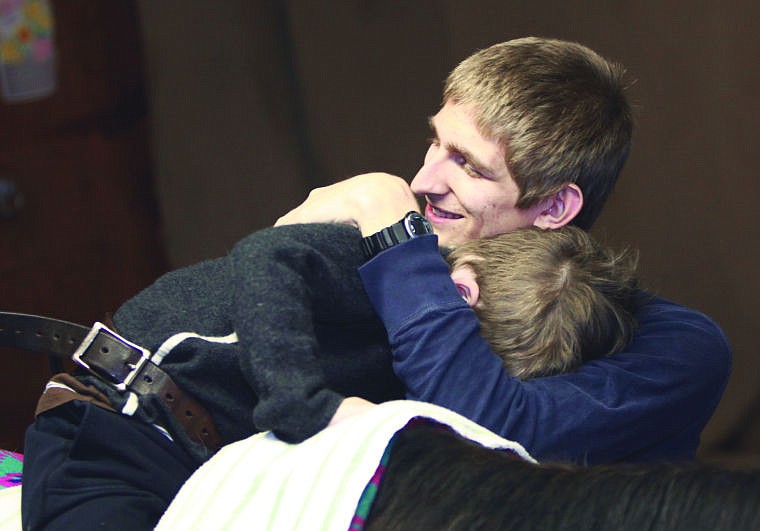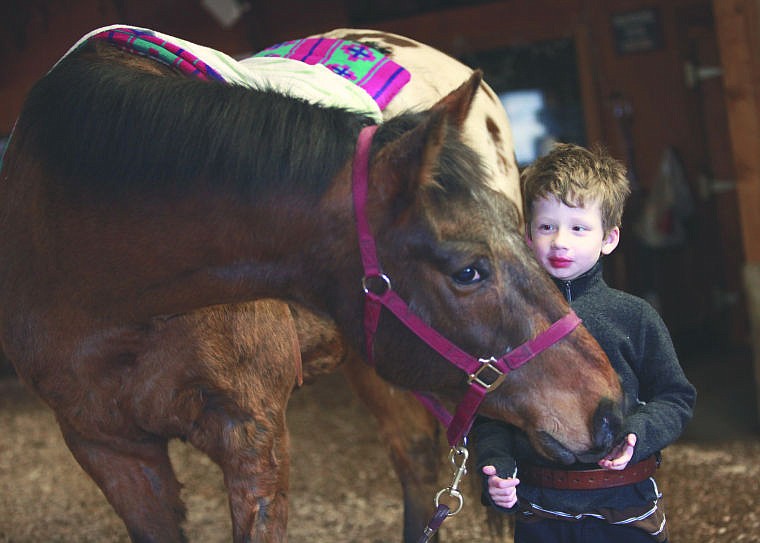Child, teen mentor find common ground in autism
Six-year-old Charlie Jones gets super excited when Skyler Bexten, 18, comes over to take care of him and his 3-year-old brother, Max.
“It’s kind of hard to excite Charlie with someone coming over,” his mother, Elizabeth Cummings, said.
Both diagnosed with autism spectrum disorder, Skyler and Charlie share an unspoken deep understanding and a bond that continues to grow. For Cummings, Skyler provides a role model for her son and the community of what people with autism can achieve and contribute.
“His success has been tremendous,” she said of Skyler. “He is a fully mainstreamed student who will graduate with honors from Glacier High School this spring.”
Skyler earned a near-perfect score on the ACT. When not hitting the books, he helps out Bob and Timothea Burmood providing horseback therapy to SAMS Riders at their west Kalispell barn facility.
“I help lead the horses around the barn but, most importantly, I talk to the kids,” Skyler said. “Being a former rider does give me sympathy for them. I understand their struggles with their social life, trying to fit in with society.”
By high school, Skyler was able to join in activities such as speech and debate. He joined the track team in his senior year.
“I didn’t do it for athletic achievement,” Skyler said. “I like the social aspect more. I enjoy the team’s company.”
He said he still has problems making eye contact and must make a conscious effort to do so. But thanks to years of therapy programs such as the SAMS (sensory and motor skills) Riders program, Skyler said most people don’t know he has autism.
“I remember one parent at the barn told me, ‘Oh, you seem so normal,’” he said with a slight laugh. “That was one of the nicest compliments I’ve ever had.’”
His mother, Lisa Bexten, serves on the board of Human Therapy on Horseback, the nonprofit providing financial assistance for riders. She took Skyler for horseback therapy at a critical point in his development.
“I was 3 and a half years old when I lost my language,” Skyler said. “After a few sessions at the barn, I started talking again.”
Charlie had a similar breakthrough as a SAMS Rider. Cummings recalled that her son tested well above average in speech at 12 months, but by 15 months, he tested as a 4-month-old with no words.
When Cummings moved back home to Kalispell from Seattle about four years ago, she heard universal praise for the horseback program. She quickly signed up Charlie, then 2 years old — with amazing results.
“He learned to speak on a horse. Within a few months, he was speaking short sentences,” she said. “He still has delays, but the progress he made so quickly that summer was just incredible to watch.”
Cummings first met Skyler a year later at the annual May fundraising benefit held by Human Therapy on Horseback. He was a featured speaker, sharing his experiences in the riding program in front of several hundred people.
She recalled that the room went silent as this articulate young man spoke with such confidence.
“It was a very emotional experience for me to see him, with his challenges — and he has challenges — to see what he has been able to achieve,” she said. “It gave me a lot of hope. For parents of very young children with autism, it can be a very hopeless place, so it was a very moving thing for me.”
Cummings said she had heard the Bermoods speak about Skyler for years. She also had watched him helping out in sessions.
One day, she was taking photos and noticed a special relationship forming between Charlie and Skyler.
“They could relate to each other, just instantly, in a way that I thought was pretty unique and pretty special,” she said. “When you see that happening with a kid who struggles in that way, as a parent, you want to invest in that relationship as much as you can.”
She spoke with the Bermoods, who supported her idea of inviting Skyler to take care of Charlie and his 3-year-old brother Max when she needs a break. Cummings next spoke to Skyler’s mother Lisa, who also endorsed the idea.
Skyler began caring for the children last summer. Cummings stayed home for the first couple of sessions as she would with any new sitter.
“What I saw was that he was really just able to understand Charlie, quickly, much more quickly than anyone else,” she said.
“We have a variety of people who work with kids who are excellent. He is by far the youngest who I trust, because he does seem to relate to the kids.”
Along with serving as a mentor to Charlie, Skyler also provided an invaluable perspective to Cummings. She said an issue will come up, and Skyler will tell her that he remembers how hard it was for him.
“Within the world of autism, to be able to reflect back on that and share it with another person is really a huge achievement for Skyler and his family,” Cummings said.
According to Skyler, stepping into the child-care role was easy. His mother operates a daycare in their home, so he is used to being around young children.
He agrees that he and Charlie share a special, unspoken understanding, although he points out that no two people with autism are alike.
“At Charlie’s stage of development, looking back on my own childhood, autism is very much like living in a box. It’s just yourself. You just think about your own needs and your own wants,” he said.
“Part of any person becoming an adult is learning how to get outside the box, how to consider other people’s needs and what they want to do.”
Skyler said he thinks dealing with autistic children really just takes a lot of patience. His biggest challenge was changing diapers, not the meltdowns people may associate with autism spectrum disorder.
“I’ve never seen Charlie have a meltdown. He still lags in communication, but he’s a friendly kid,” Skyler said. “Max and Charlie have a pretty good relationship.”
After graduating from Glacier High School this spring, Skyler plans to major in math and perhaps astronomy at Flathead Valley Community College and apply for Scholars, an enrichment program for exceptional students. He recently won a Montana University System Honor Scholarship providing four years of tuition to any school in the system, including the community college.
Skyler wants to continue mentoring Charlie as well as volunteering with the horseback therapy program. He says he really enjoys working with the riders, especially those with autism.
“It’s so wonderful talking to them. We have similar interests in science,” he said. “It’s like talking to younger versions of myself.”
Charlie just took the first steps down his educational path as a kindergartner at Woodland Montessori this year. According to Cummings, he gets therapy from the school and has an aide who works with him there.
“They have embraced him, welcomed him, taken him on with his challenges,” she said. “I’m very grateful that they were able to bring him in and celebrate him. We’ve seen him just blossom there.”
Cummings recalls her fears of finding little help here when she moved to the valley, leaving behind the state-of-the-art resources in Seattle. Now, with the help at school, therapy on horseback and many services from Kalispell’s Child Development Center, she said her family is very well supported.
She marvels at what early intervention and support have meant for both Max and Charlie. Just three years ago, Cummings hoped Charlie just would talk, but now he is learning to read, making friends, participating in circle and attending birthday parties.
“I think autism is a journey that changes with time. It changes by the child,” she said. “Our society has to change with it — change support structures, how inclusive we are, change from stigma to celebrating and highlighting these kids in the areas where their talents shine.”







